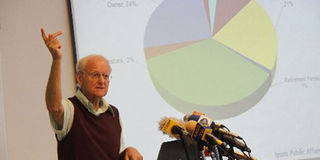Devolution has made politics more local and violent than ever before

Ipsos Synovate lead researcher Dr Tom Wolf addressing a media briefing on the latest social, political, economic and cultural barometer survey on September 19, 2014. The most recent Ipsos Synovate poll recorded an increase in confidence in county governors from 55 to 65%. PHOTO| JEFF ANGOTE| NATION MEDIA GROUP
What you need to know:
- First, many Kenyans clearly feel that they are being double taxed, and that much of the money is being wasted on what Killian Ngala has referred to as the “aesthetics of power”: the cars, flags, offices, and foreign trips
- At the national level, Kenyans complain of competition between Cord and Jubilee, and governors and the central government, which is currently playing out in parallel referendum campaigns
- Such efforts to undermine and weaken one’s political competitors are problematic as it encourages unnecessary duplication and obstacles, rather than effective planning and collaboration
Amidst the current politics and confusion it is clear that the majority of Kenyans still support devolution, while the most recent Ipsos Synovate poll recorded an increase in confidence in county governors from 55 to 65%.
However, this does not render Kenyans blind to devolution’s teething problems.
Thus, for the 28% of respondents in the recent Ipsos Synovate poll who said they do not support devolution, the majority cited political reasons (64%) arguing that the process is associated with “too much politics” (31%), that it creates divisions at the county level (23%), or that it is associated with poor leadership (10%).
In addition, 53% cited financial factors; namely that devolution is too costly (37%) or that it has prompted an increase in taxation (16%).
Moreover, qualitative research suggests that these complaints are common across the country with even staunch supporters of devolution often bemoaning the realities of county finances and political contests.
First, many Kenyans clearly feel that they are being double taxed, and that much of the money is being wasted on what Killian Ngala has referred to as the “aesthetics of power”: the cars, flags, offices, and foreign trips.
POLITICAL COMPETITION
Perhaps more importantly, there is a growing sense that devolution is associated with “too much politics”.
At the national level, Kenyans complain of competition between Cord and Jubilee, and governors and the central government, which is currently playing out in parallel referendum campaigns.
In the first campaign – Okoa Kenya – Cord’s public statements have focused on increasing county governments budgets; with less attention given to other possible referendum items such as the need to dissolve the Independent Elections and Boundaries Commission.
In the second campaign – Pesa Mashinani – governors make just one demand: more resources for the counties.
A clear overlap of interests begs the question of why the Cord leadership and county governors have not combined forces.
However, as the official opposition, Cord has an interest in articulating people’s problems and leading the campaign as a way to prove its relevance and strength vis-à-vis the Jubilee government.
ETHNIC POLARIZATION
On the other hand, partisan politics and a high level of ethnic polarisation renders it almost impossible for governors – and especially governors elected in Jubilee strongholds and on party tickets subsumed within the Jubilee Alliance – to join the Cord campaign.
Second there is competition between elected officials at the county level and national administrators, and between different elected officials.
To date, much attention has been given to contests between governors and senators with a number of senators seemingly working to undermine their colleagues with the aim of securing the governorship – and the control of associated funds – in the next election.
Unfortunately, such negative campaigning appears to be increasingly common as politicians at all levels seek to protect their position or campaign for a bigger one, as reflected in the deterioration of relations between MCAs and MPs in many areas.
Indeed, it is not uncommon for MCAs to say that they plan on vying for the parliamentary seat in the next election, that they do not talk to their MP, and that, when they do meet, they “just wrestle”.
Such efforts to undermine and weaken one’s political competitors are problematic as it encourages unnecessary duplication and obstacles, rather than effective planning and collaboration.
ETHNIC DIVISION
Finally, but not least, there is a burgeoning division between ethnic groups in many cosmopolitan counties.
One example is Mandera where analysts have linked recent violence to contests between the majority Garre and minority Degodia as the latter argue that Garre seek to control the county, while Garre present the Degodia as encroachers who seek to expand into their ethnic strongholds.
Yet, even in ostensibly peaceful areas, there is often clear tension between the majority and minority groups over the question of who benefits from political nominations, recruitment drives, employment policies, settlement schemes, and so forth.
For example, in Bungoma, there are reports that some Bukusu resent the number of positions and amount of power shared with Sabaot neighbours, while in Kericho, the fact that there is only one nominated MCA to represent minority groups has fostered a sense of marginalisation amongst those who feel left out.
However, while many feel that devolution is not working out as hoped, Kenyans are divided on whether to blame the system, the government, opposition politicians, or other actors – a division that is increasingly intertwined with ethnically polarised party politics and ongoing battle between Cord and Jubilee.





